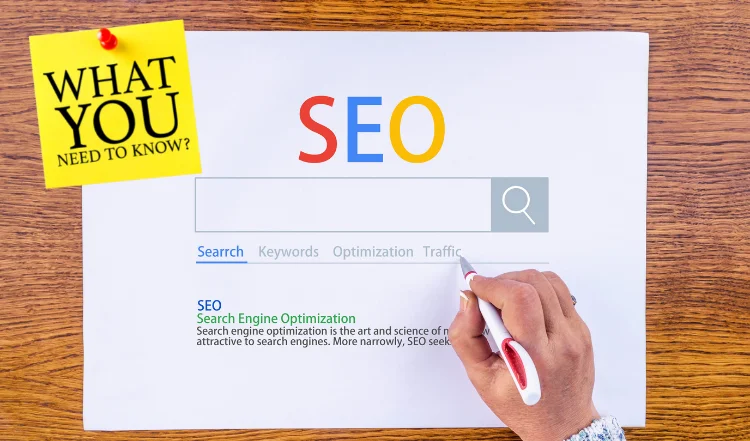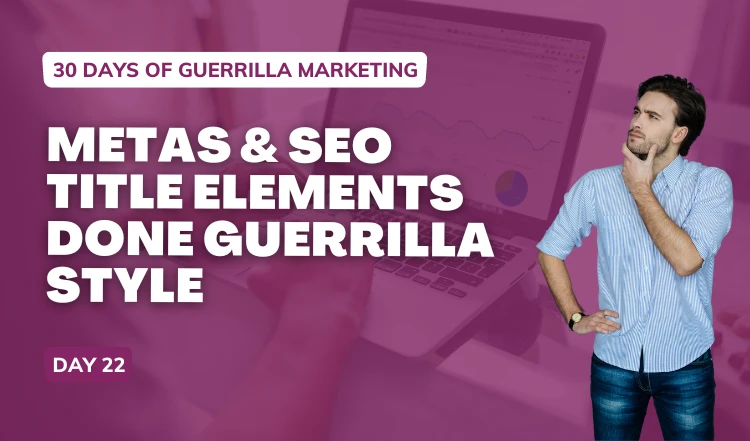Table of Contents
SEO is the process of taking steps to help a website or piece of content rank higher on Google.
The key difference between SEO and paid advertising is that SEO involves “organic” ranking, which means you don’t pay to be in that space. To make it a bit simpler, search engine optimization means taking a piece of online content and optimizing it, so search engines like Google show it towards the top of the page when someone searches for something.
Look at it this way. When someone types “vegan salad” into Google, they’re likely looking for a recipe, ingredients, and instructions on how to make it.
If you wrote an article about making vegan salad, you’d want people to find your recipe. For anyone to find it, you need to rank above all the other websites with recipes for vegan salad It’s not easy, but that’s what SEO marketing is all about.
When it comes to broader SEO, there are two equally important paths: on-page SEO and off-page SEO.
On-page SEO is about building content to improve your rankings. This comes down to incorporating keywords into your pages and content, writing high-quality content regularly, making sure your metatags and titles are keyword-rich and well-written, among other factors.
Off-page SEO is the optimization happening off of your website itself, such as earning backlinks. This part of the equation involves building relationships and creating content people want to share. Though it takes a lot of legwork, it’s integral to SEO success.
Content Really Is King
You’ve probably heard it before: “Content is king.” Bill Gates made this prediction in 1996, and it’s as true as ever today.
Why?
Because a Google user is happy when they find the result that serves their needs in the best way.
When you Google “quick and easy homemade pasta,” Google puts all its energy into delivering to you what Google believes is the best recipe for homemade pasta (that takes little time and uses few ingredients) on the entire web.
It doesn’t look for just the quickest recipe, just the easiest recipe, or throw out a bunch of online shops for frozen dinners. It tries to give you exactly what you asked for. Google always tries to provide the best experience possible by directing you to the greatest content it can find.
This means your number one job to do well with SEO is to produce great content.
That’s a dud, right? You still have to put in a ton of work. SEO is no different from any other skill: great results come from great efforts. Just like the best marketing in the world won’t help you sell a bad product; super advanced SEO is useless if you don’t have quality content.
You Need To Do Real Keyword Research
Keyword research and selection dictates your site rankings and how you describe your brand online.
Keywords even determine how you build links, including everything from the tactics you choose to how you plan on implementing them. Another common mistake people make is that they stop.
Maybe they redesign their website or come out with a new marketing campaign. They do it for a week or two, update their pages, and then stop.
They think keyword research is a one-and-done thing. In reality, it’s the exact opposite. The best SEOs are constantly doing keyword research.
Keyword research is done for several reasons, but the two primary reasons are to rank on Google and create relevant content.
Keywords can often open the door to inspiration by telling you exactly what people want to know based on what they’re searching for.
HTML & Website Code
Your site’s HTML is an important piece of the SEO marketing puzzle. Without proper tags, headers, and descriptions, Google will have a hard time figuring out what your content is about and why it should rank higher than the competition.
When people read that HTML is a part of SEO, they start to get scared, but there’s nothing to worry about.
You don’t need to understand code, and there is very little involved in the process of changing tags and descriptions.
For the most part, changing the HTML from an SEO perspective is as simple as copying and pasting.
Luckily, if your website is powered by WordPress, most of this is automated.
Site Architecture Matters
A good website architecture leads to a great user experience, which is important for SEO marketing. It focuses on things like fast loading times, a safe connection, and a mobile-friendly design.
You also need to optimize a few things for a great “search engine experience.” The more accessible your website is to Google, the better it will rank.
Building Trust Is Critical
PageRank, the famous formula the founders of Google invented, certainly isn’t the only measure they take when ranking pages in the top ten search results.
Trust is getting increasingly important, and most of the recent Google updates have hit spammy and obscure websites. Trust Rank is a way for Google to see whether your site is legit or not. For example, if you look like a big brand, Google is likely to trust you.
Think About Your Links
The importance of a solid link profile will vary from expert to expert. I still believe links are one of the most important ranking factors Google has for you.
One problem a lot of SEOs have is they don’t understand how to do it the right way. If you use the wrong tactics, you’re setting yourself up for failure from the beginning. If you choose to take the long-term strategy and build links the right way, it might take a bit longer, but you’ll thank yourself down the road.
Location, Location, Location
The next category of off-page SEO that’s worth taking a look at is personal factors. I’m talking about demographics and location.
These factors automatically impact the way someone responds to your content, but your SEO efforts also behave differently from one area of the globe to another.
While most of these are out of your control, you can do a few things to increase your chances of reaching a certain audience.
There’s no “one-size-fits-all” option when it comes to personal SEO factors.
Get Social
Let’s take a look at the social factors of off-page SEO. Besides social signals directly from the searcher, there are other ways good results on social media will help you rank better.
Whether that’s directly through more links or indirectly through a PR boost, social matters.
In short, make sure your brand has an account or page on every major social media platform including Instagram, Facebook, LinkedIn, YouTube, Twitter, Pinterest and TikTok. The more your brand (and link to your website) appears around the internet, the higher Google will rank your site. It’s an authority and reputation thing!
Google’s EAT Guidelines
As you evaluate your SEO practices, you can analyze what Google uses to train human content evaluators.
See, in addition to a massive number of algorithms, Google employs Quality Raters to improve the search engine experience for everyone.
Google explains in its evaluator guidelines that a high-quality page needs to possess a high level:
- Expertise
- Authority
- Trustworthiness
Or, as this set of guidelines is more commonly known, EAT.
Though you may not have control over all the factors from the get-go, keeping EAT in mind as you create content can help ensure your content is headed in that direction.
The most important thing to remember about SEO is there are no shortcuts in this game. You need to do things the right way and go the extra mile because that’s how you’ll stand out.
Expect to devote at least six months to it if you want to see results. Those who say SEO is a “set it and forget it” strategy are wrong. You’ll want to stay on top of your content, update it regularly, and continue creating great new content to refresh your site and show Google you’re still active.





